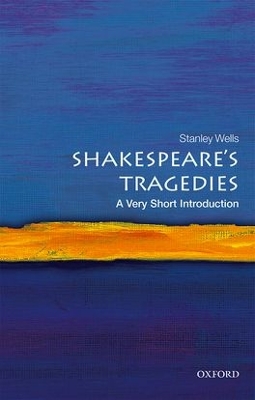Very Short Introductions
2 total works
Tragedy, including grief, pain and suffering, is a common theme in Shakespeare's plays, often leading to the death of at least one character, if not several. Yet such themes can also be found in Shakespearian plays which are classed as comedies, or histories. What is it which makes a Shakespearian tragedy, and what dramatic themes and conventions did the bard draw upon when writing them?
In this Very Short Introduction Stanley Wells considers what is meant by the word 'tragedy', and discusses nine of Shakespeare's iconic tragic plays. He explores how the early definitions and theoretical discussions of the concept of tragedy in Shakespeare's time would have influenced these plays, along with the literary influence of Seneca. Wells also considers Shakespeare's uses of the word 'tragedy' itself, analysing whether he had any overall concept of the genre in relation to the
drama, and looking at the ways in which the theatrical conventions of his time shaped his plays, such as the use of boy players in women's roles and the physical structures of the playhouses. Offering a critical analysis of each of the nine plays in turn, Wells concludes by discussing why tragedy is regarded
as fit subject for entertainment, and what it is about tragic plays that audiences find so enjoyable.
ABOUT THE SERIES: The Very Short Introductions series from Oxford University Press contains hundreds of titles in almost every subject area. These pocket-sized books are the perfect way to get ahead in a new subject quickly. Our expert authors combine facts, analysis, perspective, new ideas, and enthusiasm to make interesting and challenging topics highly readable.
In this Very Short Introduction Stanley Wells considers what is meant by the word 'tragedy', and discusses nine of Shakespeare's iconic tragic plays. He explores how the early definitions and theoretical discussions of the concept of tragedy in Shakespeare's time would have influenced these plays, along with the literary influence of Seneca. Wells also considers Shakespeare's uses of the word 'tragedy' itself, analysing whether he had any overall concept of the genre in relation to the
drama, and looking at the ways in which the theatrical conventions of his time shaped his plays, such as the use of boy players in women's roles and the physical structures of the playhouses. Offering a critical analysis of each of the nine plays in turn, Wells concludes by discussing why tragedy is regarded
as fit subject for entertainment, and what it is about tragic plays that audiences find so enjoyable.
ABOUT THE SERIES: The Very Short Introductions series from Oxford University Press contains hundreds of titles in almost every subject area. These pocket-sized books are the perfect way to get ahead in a new subject quickly. Our expert authors combine facts, analysis, perspective, new ideas, and enthusiasm to make interesting and challenging topics highly readable.
In this new offering from Stanley Wells, the pre-eminent Shakespearian scholar, comes a Very Short Introduction to the life and writings of the world's greatest and best-known dramatists: William Shakespeare.
Looking at his early life and education, Wells explores Shakespeare's social and intellectual background and the literary traditions on which Shakespeare drew. Examining the theatres and theatrical profession of the time, he also considers how Shakespeare experienced this world, both as an actor and as a writer.
Examining Shakespeare's narrative poems, sonnets, and all of his plays, Wells outlines their sources, style, and originality over the course of Shakespeare's career, to consider the fundamental impact his work has had for subsequent generations. Written with enthusiasm and flair by a scholar who has devoted a lifetime to the study of Shakespeare and his works, this is an engaging and authoritative introduction.
ABOUT THE SERIES: The Very Short Introductions series from Oxford University Press contains hundreds of titles in almost every subject area. These pocket-sized books are the perfect way to get ahead in a new subject quickly. Our expert authors combine facts, analysis, perspective, new ideas, and enthusiasm to make interesting and challenging topics highly readable.
Looking at his early life and education, Wells explores Shakespeare's social and intellectual background and the literary traditions on which Shakespeare drew. Examining the theatres and theatrical profession of the time, he also considers how Shakespeare experienced this world, both as an actor and as a writer.
Examining Shakespeare's narrative poems, sonnets, and all of his plays, Wells outlines their sources, style, and originality over the course of Shakespeare's career, to consider the fundamental impact his work has had for subsequent generations. Written with enthusiasm and flair by a scholar who has devoted a lifetime to the study of Shakespeare and his works, this is an engaging and authoritative introduction.
ABOUT THE SERIES: The Very Short Introductions series from Oxford University Press contains hundreds of titles in almost every subject area. These pocket-sized books are the perfect way to get ahead in a new subject quickly. Our expert authors combine facts, analysis, perspective, new ideas, and enthusiasm to make interesting and challenging topics highly readable.

